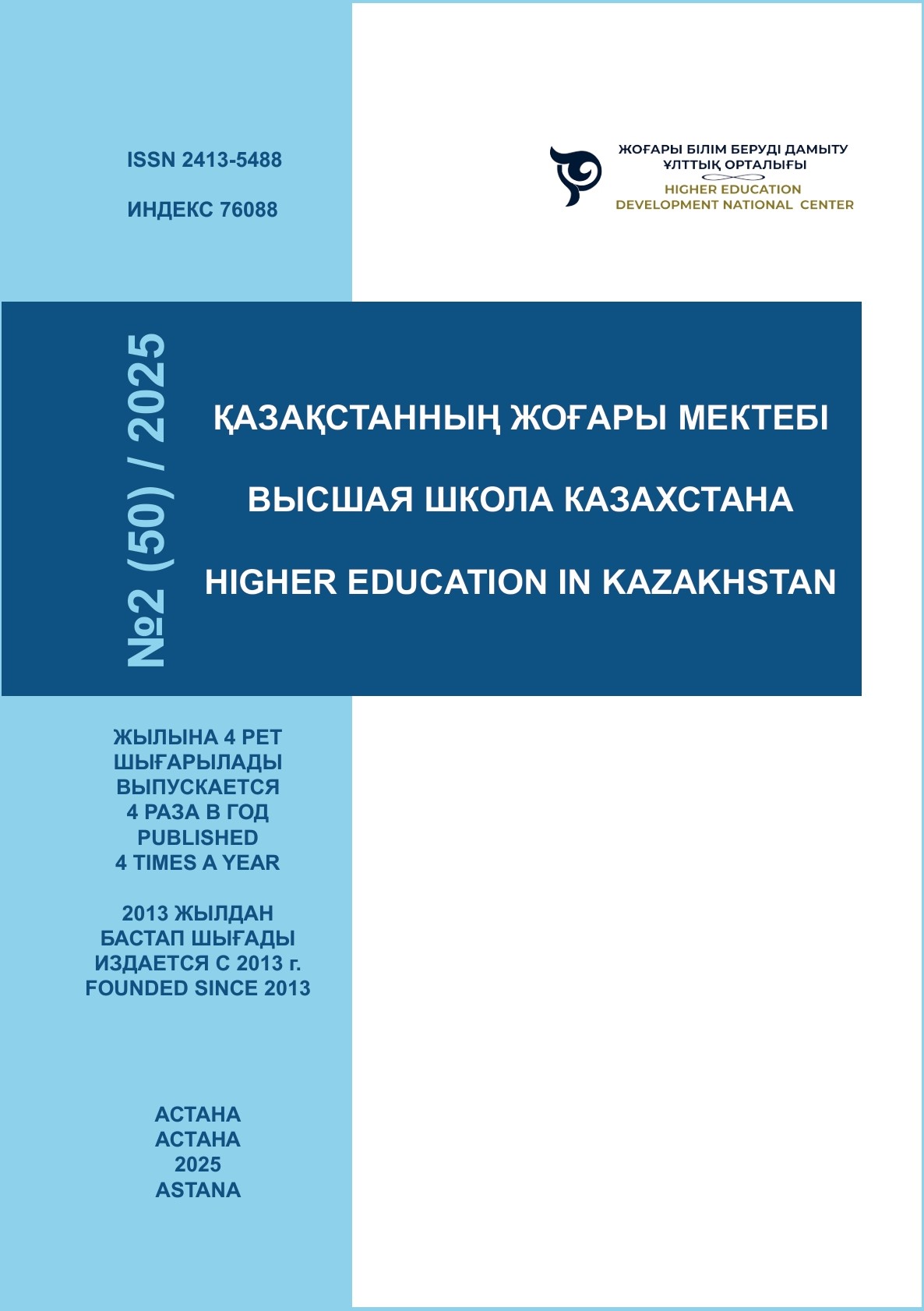INTEGRATED MODEL FOR DEVELOPING ENVIRONMENTAL COMPETENCE: SCIENTIFIC FOUNDATIONS, TECHNOLOGIES, AND REFLECTION
DOI:
https://doi.org/10.59787/2413-5488-2025-50-2-94-105Keywords:
environmental competence, cognitive component, axiological component, practical component, sustainable development, educational model, environmental education.Abstract
The article is devoted to the development, testing, and evaluation of an integrated model for developing environmental competence in students at higher education institutions. The model is based on a comprehensive approach that includes cognitive, axiological, and practical components and combines theoretical, practice-oriented, and reflective blocks. This ensures the holistic formation of environmental knowledge, value orientations, and practical skills necessary for solving sustainable development tasks in students. The model was tested at the Sarsen Amanzholov East Kazakhstan University with the participation of 88 students divided into control and experimental groups. Quantitative and qualitative methods were used to evaluate its effectiveness: testing, questionnaires, observation, and expert assessment. The results showed a significant increase in the level of environmental competence in the experimental group, especially in the axiological and practical components. The developed model has proven its effectiveness and can be implemented in educational programs for training specialists in the fields of ecology, biology, and pedagogy, contributing to the formation of environmentally responsible and professionally competent personnel
References
Abdallah, L., & Forawi, S. (2017). Investigating leadership styles and their impact on the success of educational institutions. The International Journal of Educational Organization and Leadership, 24, 19–30. https://doi.org/10.18848/2329-1656/CGP/v24i02/19-30
Dlimbetova, G., Aliyeva, A., & Ayazbayeva, A. (2015). Development of ecological competence for future professions. Biosciences Biotechnology Research Asia, 12(1), 311–319. https://doi.org/10.13005/bbra/1667
FSFEI of HE "I.N. Ulyanov Chuvash State University", & Khuraskina, N. V. (2017a). Students’ ecological and legal competence development based on ecological upbringing and education (pp. 121–123). https://doi.org/10.21661/r-117190
Jørgensen, S. E. (2008). Overview of the model types available for development of ecological models. Ecological Modelling, 215(1–3), 3–9. https://doi.org/10.1016/j.ecolmodel.2008.02.041
Karter, J. M. (2019). An ecological model for conceptual competence in psychiatric diagnosis. Journal of Humanistic Psychology. https://doi.org/10.1177/0022167819852488
Klochko, O., & Fedorets, V. (2023). Conceptualization of the cultural and artistic model of the ecological competence of the mathematics teacher. Educological Discourse, 41(2). https://doi.org/10.28925/2312-5829.2023.212
Liulenko, S., & Podzerei, R. (2022). Formation of ecological competence of the individual as one of the main tasks of sustainable development education. Ecological Sciences, 42(3), 226–229. https://doi.org/10.32846/2306-9716/2022.eco.3-42.38
Lutsk Pedagogical College, & Zameliuk, M. (2020). Ecological trail as a component of the development of ecological competence of preschool children. Education and Development of Gifted Personality, 3, 38–42. https://doi.org/10.32405/2309-3935-2020-3(78)-38-42
McKay, S., Richards, N., & Swannack, T. (2022). Ecological model development: Evaluation of system quality. Engineer Research and Development Center (U.S.). https://doi.org/10.21079/11681/45380
Ogbu, J. U. (1981). Origins of human competence: A cultural-ecological perspective. Child Development, 52(2), 413. https://doi.org/10.2307/1129158
Özkan, C., Çepni, S., Maratkyzy, N., Vural Arslan, T., & Durak, S. (2024). A new perspective on STEM education: The possible contributions of architectural education. Journal of Turkish Science Education, 21(3), 599–619. https://doi.org/10.36681/tused.2024.032
Palshkova, I. O. (2003). Methodological principles of professional formation of pedagogical activity of future teachers. Educational Dimension, 6, 82–83. https://doi.org/10.31812/educdim.5222
Pedersen, S., & Bang, J. (2016). Youth development as subjectified subjectivity – A dialectical-ecological model of analysis. Integrative Psychological and Behavioral Science, 50(3), 470–491. https://doi.org/10.1007/s12124-015-9337-z
Ponomarova, N., & H. S. Skovoroda Kharkiv National Pedagogical University. (2018). Theoretical and methodological bases for future IT teachers training for professionally-oriented work with pupils. Continuing Professional Education: Theory and Practice, (1–2), 47–51. https://doi.org/10.28925/1609-8595.2018(1-2)4751
Ridei, N., & Tolochko, S. (2018). Development of teacher ecological competence in the system of postgraduate pedagogical education for sustainable development. Humanities Science Current Issues, 2(21), 144–148. https://doi.org/10.24919/2308-4863.2/21.167324
Sotska, H., & Kuzmenko, H. (2019). Methodological aspects for the preparation of future teachers of fine arts. ScienceRise: Pedagogical Education, (2)29, 17–21. https://doi.org/10.15587/2519-4984.2019.161529
Stagl, S. (2017). Ecological economics as a new integrative approach. In The WTO, agriculture and sustainable development (pp. 311–316). https://doi.org/10.4324/9781351282123-18
Vdovenko, T., & Izmail State University of Humanities. (2022). Formation of ecological competence among university students. Scientific Bulletin of the Izmail State University of Humanities. Section “Pedagogical Sciences”, (60), 9–14. https://doi.org/10.31909/26168812.2022-(60)-1






